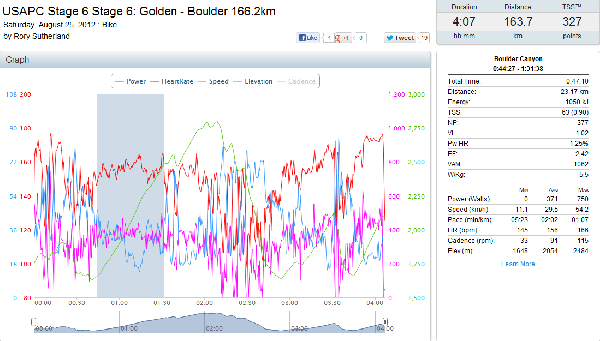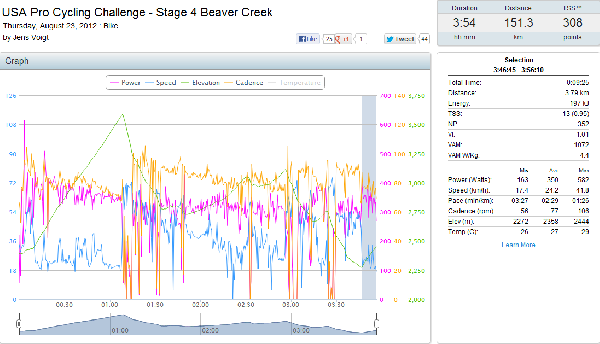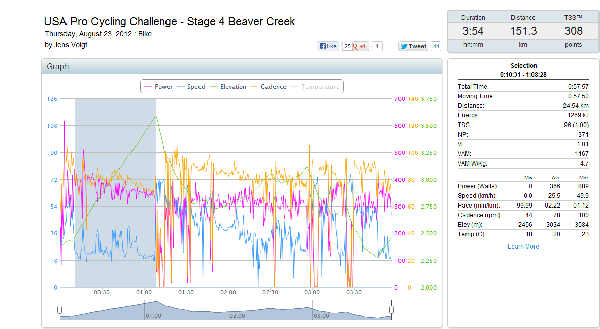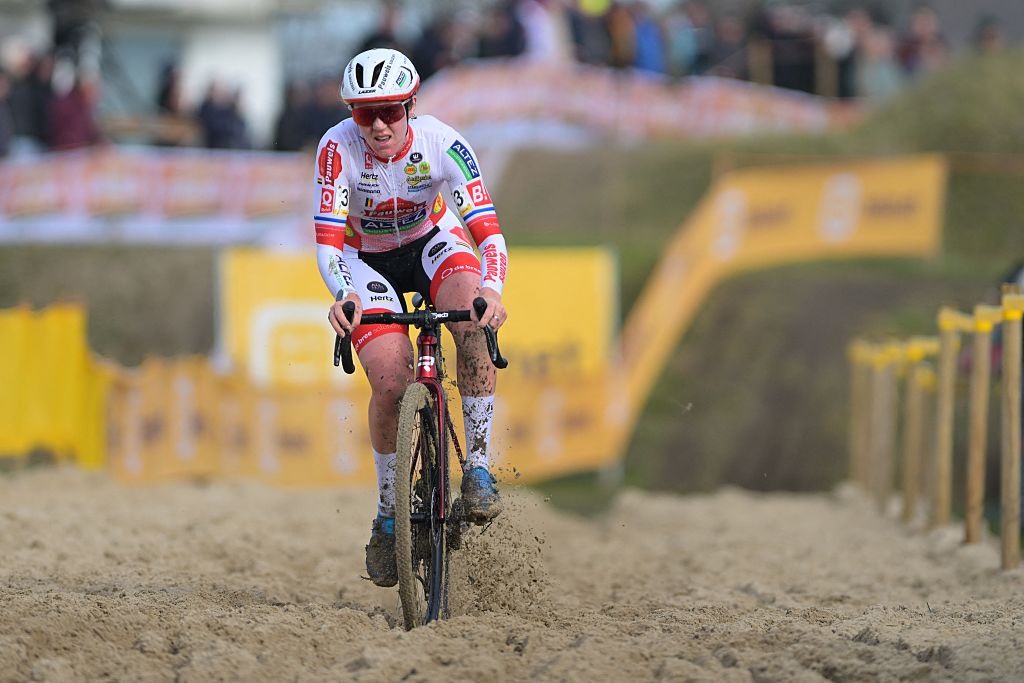Forme Coaching race analysis: USA Pro Cycling Challenge, stages 4 & 6
Race data analysis from Stephen Gallagher
The latest race content, interviews, features, reviews and expert buying guides, direct to your inbox!
You are now subscribed
Your newsletter sign-up was successful




This year’s USA Pro Cycling Challenge really come down to the wire in a tense final day ITT to decide the overall standings that was bravely fought between Tejay van Garderen (USA) BMC Racing Team, Levi Leipheimer (USA) Omega Pharma-Quickstep and Christian Vande Velde (USA) Garmin – Sharp. You know you have had an exciting race when it comes down to the final day, and to prove it we have some terrific data files that show us just what it took to win a stage along...as well as survive the full 7 stages.
We are extremely lucky to have two stage winning files from Jens Voigt (RadioShack-Nissan-Trek) and Rory Sutherland (UnitedHealthcare Pro Cycling Team), both of whom are huge public favourites. Jens for his legendary exploits over many years as a professional, and Rory now for pulling off a magnificent win in his adopted home town of Boulder, atop on of of American cycling’s most iconic mountains, Flagstaff.
1:00 min 543W
5:00 min 417W
10:00 min 404W
20:00 min 389W
30:00 min 379W
If you take into account that altitude can affect between 10-20% of your Functional Threshold, these watts are very impressive for the big German. His ability to make an extremely hard pace on the first climb of the day, Independence Pass ,and to continue to produce a hard tempo for the next 130-odd km is the trait of a truly experienced rider with a big engine. He performed 365W (4.7 w/kg) on the 23-km Independence Pass ,which took him 56 minutes to complete. This would have been an effort close to his adjusted threshold at altitude. Performing a sustained threshold effort for close to an hour at the start of the stage and continuing to ride at around 80-85% of his threshold for the next 2.5 hours holding off the peloton is a visible show of extreme physical power, and the mental ability to put yourself in the “hurt box” for a long time. This ability to suffer and keep suffering is what this sport is about, and no better man to show you this ability than Jens. As the bunch was breathing down his neck in the final kilometers and the fight for the GC was being played out behind, Jens performed another threshold effort of 350W (4.4w/kg) on the last climb of Beaver Creek, which lasted around 0:09:30 for 3.8 km. Remember that by the start of the final climb,he had ridden for 3 hours and 45 minutes at an average of 327W normalized and 3,994 kj, then he had to do the final push for the line on Beaver Creek. Impressive.
Stage 6: Rory’s Home Victory
See Full TrainingPeaks Activity Viewer here
The stage was again off to a very aggressive start with Rory being part of the day’s 14-rider break ,which saw him hitting around 900W on occasion in the first 15 minutes to make the race-winning move. All of this in the lead-up to the first big climb of the day, Boulder Canyon. Rory climbed the 23.2 km from Boulder to the town of Nederland in 0:47:10, averaging 371W (5.5 w/kg) and sitting at a good rhythm of 91 rpm on this long climb. A long, sub-threshold effort was needed for the breakaway to increase its lead over the main GC group, who was chasing behind.
The final showdown was to come on Lee Hill and the finish to Flagstaff. The penultimate climb up Lee Hill saw the break fragment and splinter thanks to the blistering pace being set by Jens Voigt. Rory had to hold a sustained effort of 400W for approximately 23:43 (11.9km), again using his ability to keep a sustained rhythm of 93 rpm on this long climb. This effort was close to Rory’s threshold, and his ability to recover from such prolonged efforts would be crucial in his fight for the win as they approached the ascent to Flagstaff. Ability to recover between such long efforts is a real trait of a top-flight professional such as Rory, and from his performance on Flagstaff it is easy to see his pedigree.
The latest race content, interviews, features, reviews and expert buying guides, direct to your inbox!
On this final climb Rory really pulled out all the punches, producing his peak 20-minute power for the stage along with a massive 14-minute effort to the line above his threshold to catch and drop the other aggressors such as Voigt. In doing so he produced 464W Normalized Power for close to 20-minutes (6.4w/kg), along with a 472W (6.8w/kg) Normalized Power in the last 5 km. His ability to produce these big numbers after a long day in the saddle is impressive to say the least. Rory has the adaption to altitude which many of his European counterparts do not have, along with knowing each meter of the final climb like the back of his hand. With a home crowd shouting him on, he had all his cards to lay out in this final 20 minutes of racing, and he played them perfectly.
